Share Your Thoughts!
With the dramatic changes in society and the evolving nature of work, talent mobility is experiencing a highly dynamic period. Now, more than ever, addressing real-world challenges and exploring practical solutions is crucial.
At TRC, we pride ourselves on being a team of inquisitive professionals dedicated to continuous improvement within ourselves, our organization, and the global mobility industry. We are eager to hear your insights!
As a global mobility professional, we invite you to share your thoughts on the key questions shaping our industry today. We will compile and share the results of these surveys here.
Q4 2024 Results: Are you currently using AI tools or technologies in your job?
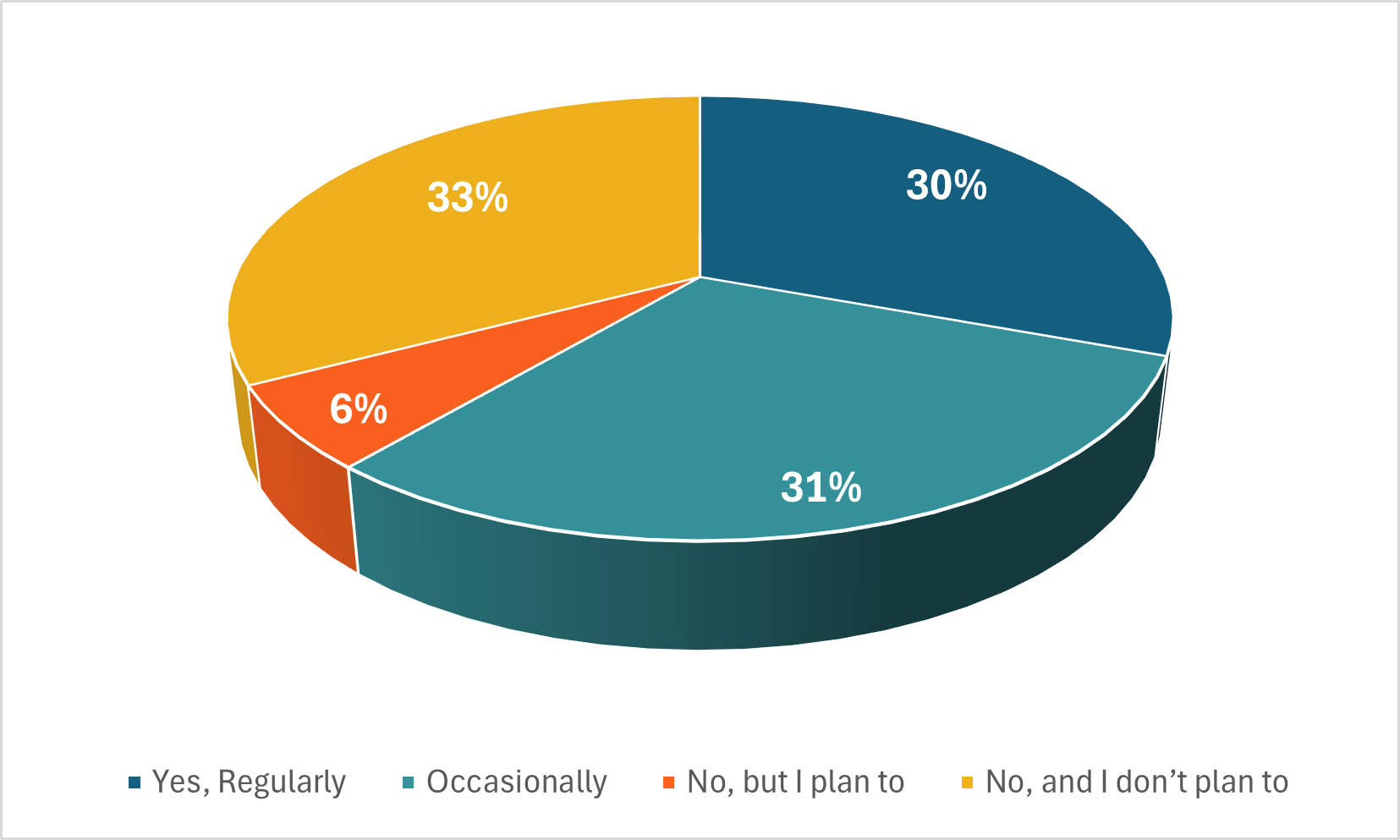
Q3 2024 Results: How many days per week are you currently required to spend in a physical office location?

Q2 2024 Results:
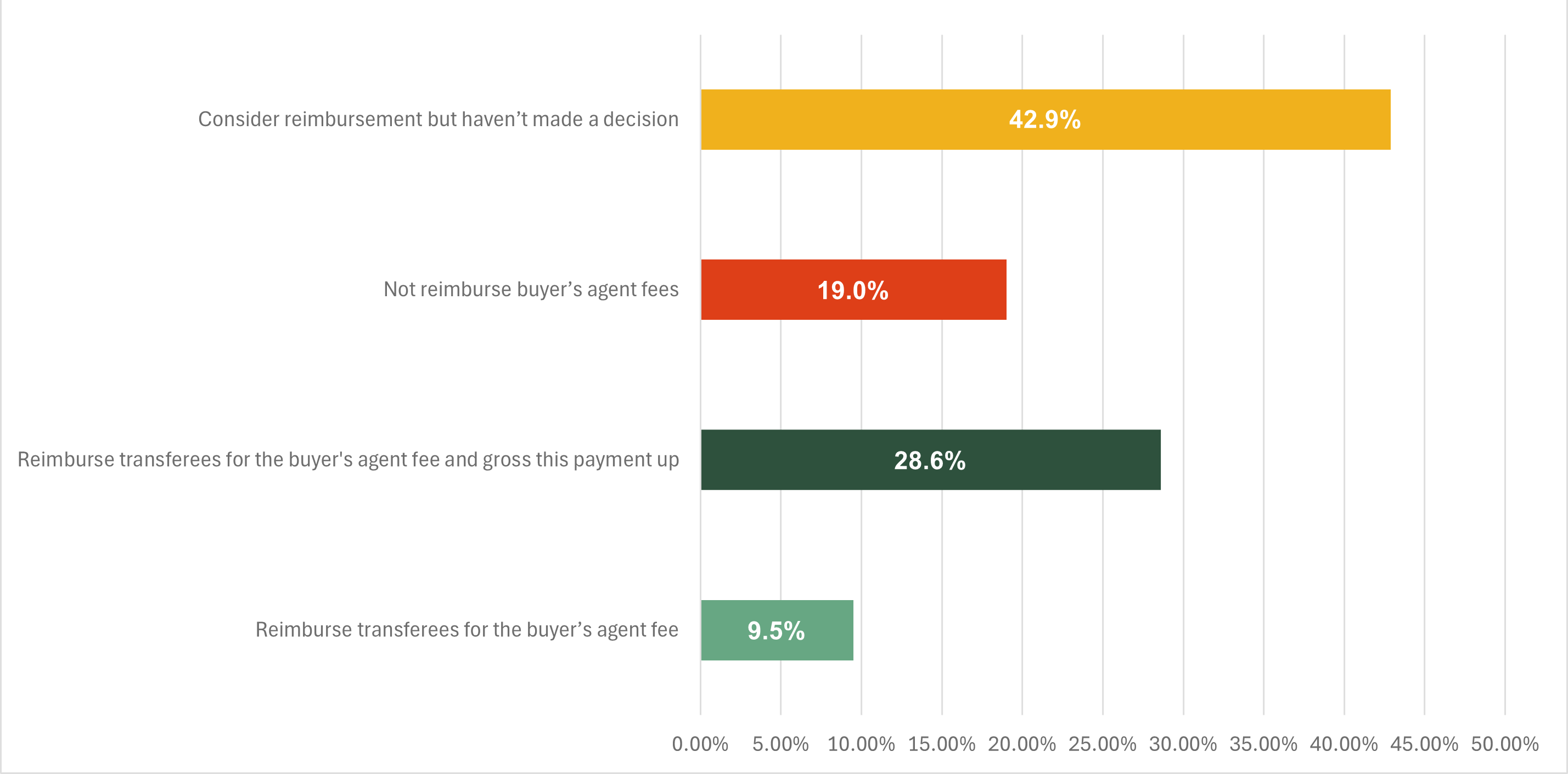
Q1 2024 Results: Have you incorporated AI into your company's relocation program administration?

Fall 2023 Results: Have you recently enhanced your relocation benefits to persuade employees to relocate?

Spring 2023 Results: Is your company considering, or have you implemented, a hiring freeze?

Results: Are your employees requesting special concessions or consideration to relocate?

Results: Are your employees declining potential relocations due to destination housing availability and cost concerns?
Nearly two-thirds of our respondents indicated that some or many of their employees are turning down moves because of destination housing concerns. As prices continue to soar and mortgage rates continue to rise, affordability likely will become even more of a concern. Will employees begin to ask for policy concessions to mitigate these costs or request full-time remote work in lieu of a transfer?

Results: If you relocate employees outside the U.S., do you expect your 2022 global relocation activity to increase, decrease or remain flat?
Our respondents were very bullish on the year ahead. Eight-two percent expect their global relocation activity to increase, while none expected it to decrease. Eighteen percent expected their global relocation activity to remain flat. The numbers reflect a continuing return to pre-covid activity.

Results: Has your company adopted a hybrid work model, with some days in the office and some days working remotely?
This TRC pulse survey offers further confirmation of a broad-based move to hybrid work. Nearly half of respondents have adopted hybrid work for all employees, and 72% --nearly 3 out of 4 employers – have adopted hybrid work for at least some employees. What was initially a short-term covid workaround is becoming a more settled policy at many companies.
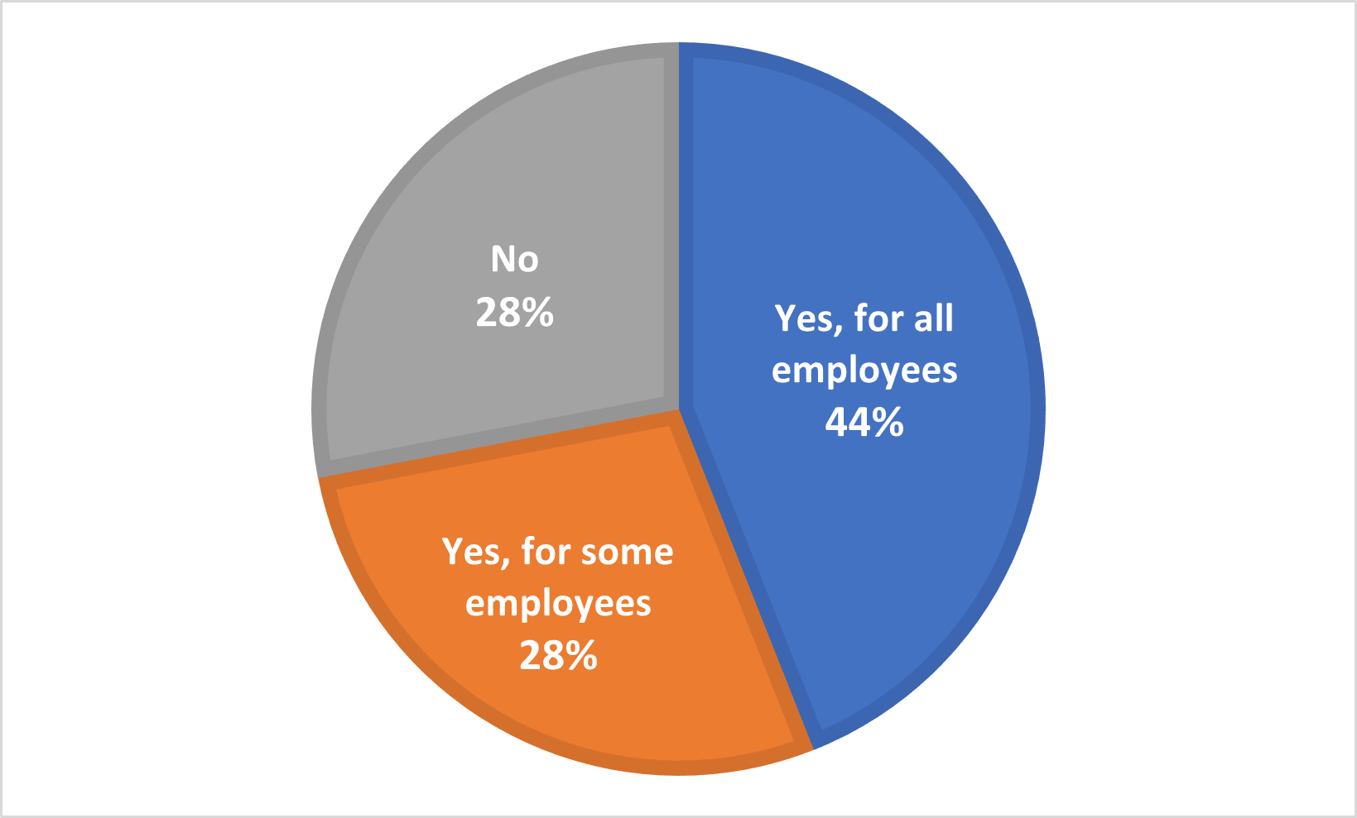
Results: Has your company postponed its return to office date?
Thirty-one percent of respondents said their company had postponed its return to office date. Sixty-nine percent said their company had not delayed the return to the office.
At this stage, many companies have made concrete plans to return to the office, though in some cases, that return will not be until well into 2022.

Results: Has your company experienced increased turnover during the past year?
The pandemic inspired many people to reassess their personal and professional lives, with some changing jobs or career paths. Has your company experienced increased turnover during the past year?
Forty-nine percent of respondents said their company has experienced increased turnover this year. Twenty-five percent said their company is not experiencing increased turnover. Twenty-six percent aren’t sure.
Read more about what economists are calling the Great Resignation.
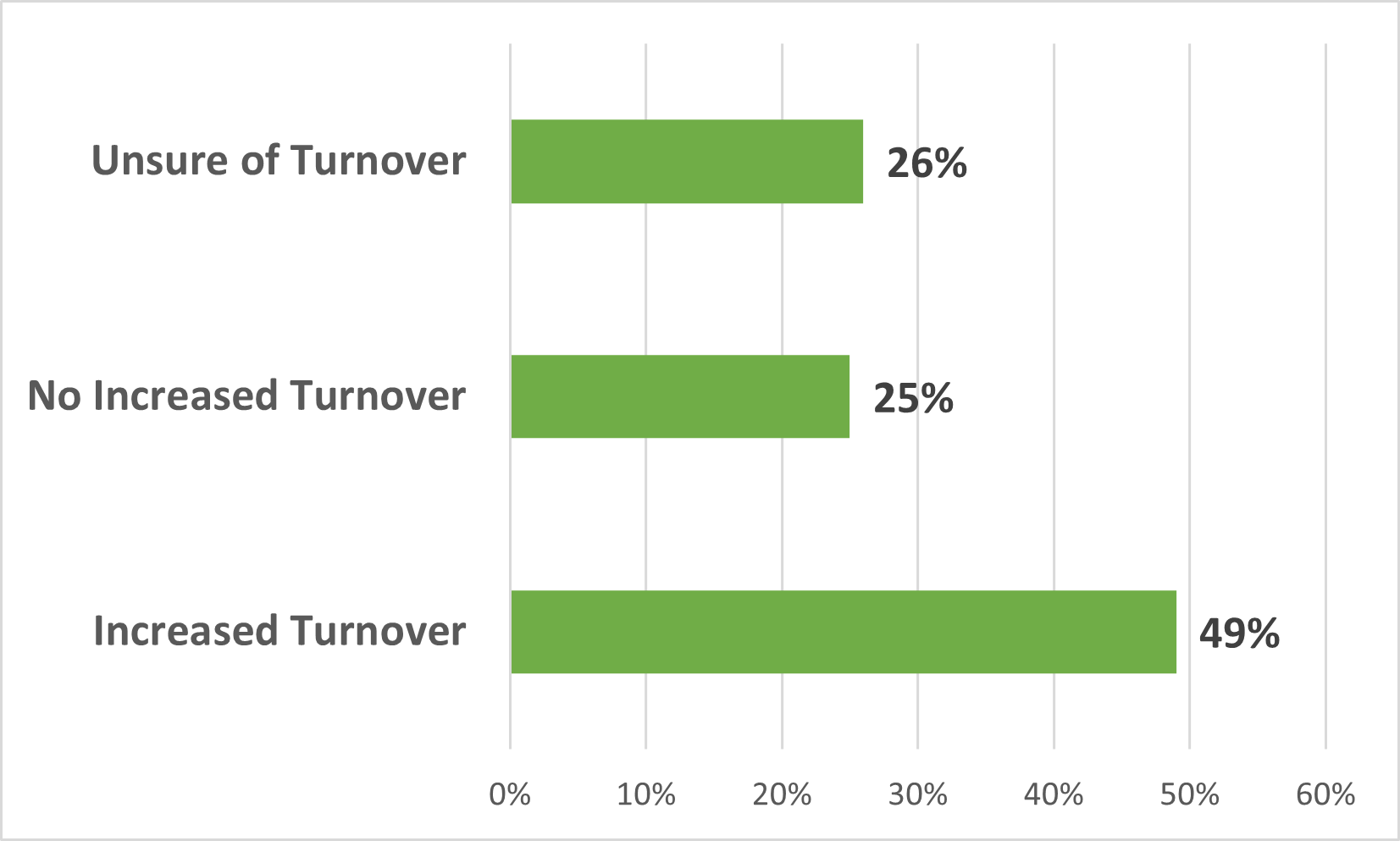
Results: Do you know where your remote employees are working?
Most employers believe they know where their remote employees are working. Forty-six percent of respondents say they know where all of their remote employees are working. Fifteen percent say they know where most of their remote employees are working. Thirty-nine percent admit they’re not sure.
Employee work location affects taxation and company obligations in the work locations. And states have become increasingly aggressive in collecting revenue from employees working in their state, whether they are residents or not.
Results: Does your company have a target date for employees to return to the office?
Forty-three percent of respondents do not have a target date for their return to the office. Twenty-four percent do have a date, and an additional 12% have a target date for some employees. Fifteen percent are already back in the office, and six percent plan to work remotely permanently and not return to the office.
With the recent loosening of Covid restrictions, including mask mandates, it will be interesting to see if more companies make concrete plans to reopen their offices.
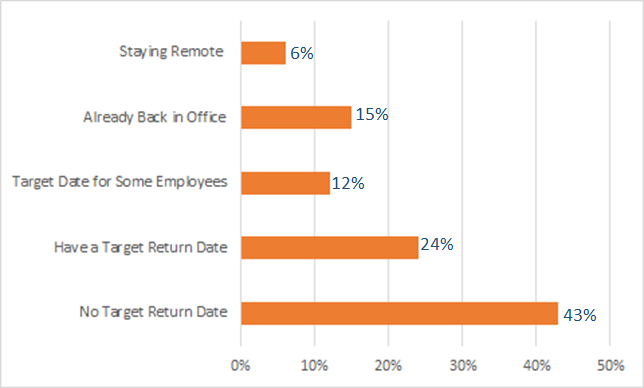
Results: Are you permitting employees who were hired into one of your offices but are now working remotely to relocate and work from a different location?
(For example, an employee worked in your Chicago office full-time, began working from her home in the Chicago suburbs due to the pandemic and now wants to move to Tampa (where you do not have an office) and work remotely from there.)
Our respondents were nearly evenly divided on this question. Thirty-three percent of respondents said they would permit employees to work from anywhere. Thirty percent said they would not allow this. Slightly more respondents (37%) said they would make this decision on a case-by-case basis.

As companies begin to plan their post-COVID work environment, they are likely to receive more work from anywhere requests or even demands, and they’ll need to plan how they will manage them.
Results: With the introduction of a coronavirus vaccine, do you expect your 2021 relocation activity to increase, decrease or remain flat?
Forty-seven percent of respondents expect their company’s relocation volume to increase in 2021 due to the introduction of the coronavirus vaccine. Thirty-five percent expect their relocation activity to remain flat, and 18 percent believe their relocation volume for 2021 will decrease.
This suggests that the much-discussed post-Covid volume surge might not be as dramatic as speculated and that there could be considerable variation from company to company. It is likely that many companies are still sorting out what their post-Covid work environment will look like, including whether and how they will incorporate remote work, whether they will maintain their current office space and locations, and how these offices will be configured.
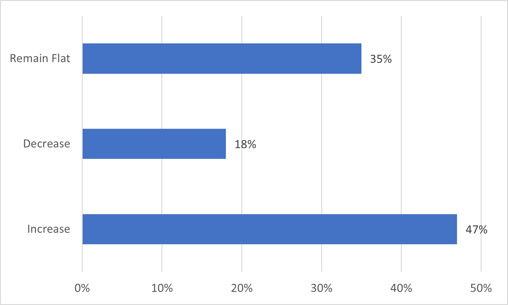
Results: Are you currently working in your office, working from your home, or working from a remote location other than your home?
In our final pulse survey for 2020, we asked, “Are you currently working in your office, working from your home, or working from a remote location other than your home?”
Almost two-thirds of our respondents (62%) indicated they are working from their home. Nearly one-third (29%) are working from their office. A smaller number (9%) are working from a remote location other than their home.

Results: Have you implemented any of these relocation program cost-saving initiatives this year?
In this survey, we asked “Have you implemented any of these relocation program cost-saving initiatives this year? Respondents could choose one or more responses.
Almost one-third of our respondents (31%) have not implemented any specific cost-saving initiatives in 2020. For those who have implemented cost-saving initiatives, the most popular were reducing the number of global relocations (25%); reducing the number of U.S. domestic relocations (19%), ending assignments early (13%); and switching to a lump-sum program (13%).

Results: How is your company currently managing business travel for employees?
In this survey, we asked “How is your company currently managing business travel for employees?” More than half of our respondents (55%) said that business travel was permitted only on an exception basis. Another 27% said that their company currently doesn’t permit business travel at all. Of the remaining respondents, 5% said that business travel is permitted within the US only and another 13% said that business travel is permitted without restriction.

Results: Do you believe the ongoing coronavirus pandemic will affect employee relocation / assignment acceptance rates?
 In this TRC Pulse Survey, we asked, “The U.S. and other countries are beginning to reopen and employees are slowly starting to return to offices. Given this, do you believe the ongoing coronavirus pandemic will affect employee relocation/assignment acceptance rates?” More than 70% of respondents said “yes”. Almost 11% said “no”, and about 19% were not sure.
In this TRC Pulse Survey, we asked, “The U.S. and other countries are beginning to reopen and employees are slowly starting to return to offices. Given this, do you believe the ongoing coronavirus pandemic will affect employee relocation/assignment acceptance rates?” More than 70% of respondents said “yes”. Almost 11% said “no”, and about 19% were not sure.
This is obviously a fluid situation, and the pandemic is not following a linear pattern, so it will be interesting to see how willing employees will be to consider a global assignment.
Results: Will more employees be working remotely on a permanent basis after the Coronavirus pandemic subsides?

In this TRC Pulse Survey, we asked, “Will more employees be working remotely on a permanent basis after the Coronavirus pandemic subsides?” An overwhelming 83% of respondents said “yes”. Should this play out as our respondents believe, it would be a significant consideration for companies reviewing their talent mobility program.
Results: How is your relocation program being affected by the Coronavirus threat?
In TRC’s most recent Pulse Survey, we asked, “How is your relocation program being affected by the Coronoavirus threat?” Respondents could choose more than one response. A majority of respondents indicated they had canceled business travel, removed assignees from affected regions and were allowing employees to work remotely. Many also have postponed relocations. A smaller number indicated they were using virtual meetings, though this might increase as stay-at-home orders are extended.
(Note: This survey was opened in early March 2020, before some companies had implemented measures in response to the Coronavirus. Respondents could choose more than one response, so results do not equal 100 percent.)

Results: How do companies expect their relocation activity to perform this year?

TRC’s first Question of the Month of 2020 asked respondents whether they expected their 2020 relocation activity to increase, decrease or remain flat. Our respondents confirm that relocation is becoming an increasingly popular way for companies to combat talent shortages. Half of the respondents said they expected relocation activity to increase somewhat to significantly. About 14% expected activity to remain flat and about 12% expected activity to decrease somewhat to significantly.
Results: How many domestic policy tiers does your company currently use?
 TRC’s 2019 year-end Question of the Month asked respondents how many domestic policy tiers their company currently uses. While the most popular response was one, three was also a common response. A significant number indicated their company still uses five or more tiers.
TRC’s 2019 year-end Question of the Month asked respondents how many domestic policy tiers their company currently uses. While the most popular response was one, three was also a common response. A significant number indicated their company still uses five or more tiers.
To learn more about today’s relocation policy trends, get TRC’s complimentary 2020 U.S. Domestic Relocation Policy Best Practices ebook here.
Results: Is your organization currently using, or considering adopting, a core-flex relocation program?
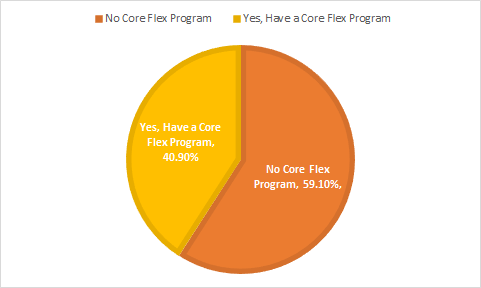
TRC’s October Question of the Month asked respondents if they were currently using or considering adopting a core-flex relocation program. Nearly half of respondents said they were either already using a core-flex program or they were considering it. Core-flex programs have pros and cons, but they can introduce an element of choice that employees like while still allowing companies to control relocation costs. Get TRC’s complimentary Core-Flex Relocation Programs ebook here.


